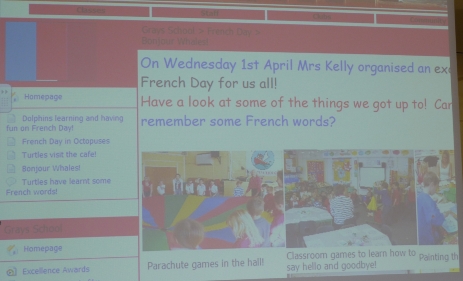Learning Platform or Virtual Learning Environment?
What's in a name? I mean, does it matter if you call a learning platform a learning platform, or a VLE? I have to say that until I visited Grays Infants School a few days ago, I tended to use the term 'Virtual Learning Environment' on the purely lazy grounds that (it seems to me) more lay people have heard of that term than the term 'learning platform', meaning that there was less explaining to do.
 The Learning Platform is central to the school's activitiesBut Christine Terrey, Headteacher, had the very firm opinion right from the start of the school's virtual journey that the term 'learning platform' had to be used. Why?
The Learning Platform is central to the school's activitiesBut Christine Terrey, Headteacher, had the very firm opinion right from the start of the school's virtual journey that the term 'learning platform' had to be used. Why?
"Because we wanted to retain the focus on 'learning'.", she says.
What we saw was a very good implementation of a learning platform. Paradoxically, what made it good was that the emphasis is not on the learning platform itself, but on its role in supporting and adding value to the work the school is doing anyway.
I recently started a series about change management, and three of the essential ingredients, which will each form the basis of an entire article, are putting learning first, collaborating with other staff and putting support in place.
Grays school exemplifies each of these aspects. Firstly, the learning platform hosts activities which the children do in real life, not just on-screen. Secondly, the staff have a monthly meeting in which they work on and share stuff for the VLE. Thirdly, the support staff have time built into their timetable for learning platform-related work.
Grays has even Nursery children, ie 3-4 years old, logging on with their own password, using icons, which affords the opportunity for the adult to discuss shapes. One big problem with schools that prepare their children really well for their digital lives is that all too often the children are let down at the next stage in their schooling. Doug Woods, in a recent comment on this website, vividly drew attention to this, citing the views of children as young as Year 6 (10-11 year olds).
The Headteacher at Grays has sought to avert this situation by working closely with the local Junior school, which uses the same type of Learning Platform.
The Learning Platform at Grays is clearly a central component of what the school does. As well as hosting the podcasts which the children make, it serves as a repository for summer holiday activities, and a meeting place, in the forums, for children, staff and parents alike. Parents are not only able to see their children's work, but are encouraged to comment on it through the wiki tool provided.
It was clear from meeting the parents that the learning platform, along with the children being able to take home internet-enabled netbooks, has made a huge difference to everyone. Not least, it has encouraged parents to get involved in their children's education in a way that the dry-as-dust term 'online reporting' could never suggest. Indeed, I suggested to Ray Tolley, who is organising a Think Tank for Naace on the subject of parental engagement, that he invite Mrs Terrey along as a speaker. He told me he already had.
The school is doing some great work, and a video of the visit will form part of Becta's collection of Next Generation Learning vignettes designed to inspire and suggest ideas to others. I will let you know when it's available: you will not want to miss it.
If you found this interesting, you may like to read the follow-up article and video.